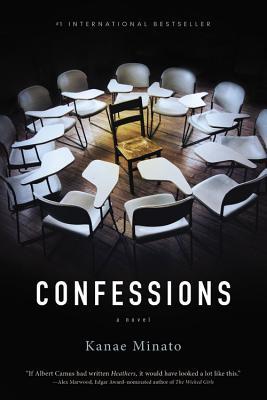The bestseller status in Japan and Oscar nomination didn’t get me to pick up Kanae Minato’s Confessions; it was the blurb.
Blurbs have become something of a joke within the book world: Shteyngart blurbs about a thousand books a year, says he’s retiring, but then you see his quote on another new book. Jennifer Egan blurbs, Sam Lipsyte blurbs, and even Carrie Brownstein has a blurb on the back of Merritt Tierce’s Love Me Back. We make fun of the blurb and overlook it because they seem to disposable, like the person that typed it up probably didn’t even read the book, that they just took a look at the press release and turned in a tweet’s worth of characters telling people in a very lofty way why they should buy their book. Yet I’ve been assured time and time again that isn’t the case, that most blurbers take their blurbing very seriously, but that doesn’t stop the fact that the state of the blurb is in question, that a lot of people even question their importance at all.
In the case of Minato’s Confessions, the blurb on the cover won me over: “If Albert Camus had written Heathers, it would have looked a lot like this.” How could I not pick up a book after reading Alex Marwood’s description of it that combines dark teen comedy from the 1980s with our favorite Nobel Prize winning existentialist?
The blurb was pretty dead on correct. I’m not sure if I set myself up to experience the book in a certain way, but the story itself, involving a grieving teacher, and the story that unfolds about who killed her young daughter, why they did it, and how they will pay, is tough to put down. Yet I can’t help thinking I would have been a little less inclined to read it had I not seen the blurb. A similar thing happened with Max Neely-Cohen’s Echo of the Boom, which was touted as “Equal parts Gossip Girl and Gravity’s Rainbow,” and delivered on that combination for the most part.
The book blurb with the pop culture reference is something a little different from the everyday blurb, because it catches the eye and gives the reader a different point of reference. How the blurb is written is left to the discretion of the person writing it, where the blurb goes to the publisher and writer of the book (at least I assume that’s how it goes), and sometimes there are some great blurbs. Yet I’d argue that the pop culture blurb is the way to go for everybody involved, take a chance, draw a comparison, and try to give the reader something more to chew on.
Follow Vol. 1 Brooklyn on Twitter, Facebook, Google +, our Tumblr, and sign up for our mailing list.


1 comment
Loved ECHO OF THE BOOM. Gave it full review on Literary Man: http://literaryman.com/2014/07/22/book-need-read-2014/